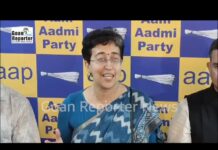 GOA, 22nd NOVEMBER 2018:…. The Other Story opened the Israel-Country Focus … Direct flight from Goa to Tel-Aviv to be introduced …. IFFI Lifetime Achievement Award winner Dan Wolman’s upcoming script is partly based in India … The biggest mafia which is ruining this industry is the multiplex mafia,’ says Rahul Rawail, Chairman of the Indian Panorama, Feature section.
GOA, 22nd NOVEMBER 2018:…. The Other Story opened the Israel-Country Focus … Direct flight from Goa to Tel-Aviv to be introduced …. IFFI Lifetime Achievement Award winner Dan Wolman’s upcoming script is partly based in India … The biggest mafia which is ruining this industry is the multiplex mafia,’ says Rahul Rawail, Chairman of the Indian Panorama, Feature section.
The 49th edition of the International Film Festival kicked off on a celebratory note amongst an august gathering of celebrities, film fraternity and cine buffs. Expressing his pleasure about his country, Israel being the focus country this year, His Excellency Consul General of Israel to India Ya’akov Finkelstein said, “Through cinema we want to fortify the relations between India and Israel. I want to encourage the people of India to visit Israel and also make it a filming destination as I encourage the thought of seeing is believing. It is part of the growing partnership between Israel and India that embraces all levels of cooperation from the government to the business sector to people to people relations to the cultural relations between two countries.”
The 10 Israeli films offer a glimpse into the issues plaguing his country, history, landscapes, he said. The section opened with director Avi Nesher’s The Other Story. In Shalom Bollywood: The Untold Story of Indian Cinema, one of the other movies selected, viewers are introduced to the 2000 year-old Indian Jewish community and its place in shaping the Hindi film industry. The movie is directed by Danny Ben Moshe.
He also highlighted the co-production signed between the two countries that will enable cross cultural ties. He elucidated that Dharma Productions had already shot their movie Drive there and more films are in the pipeline.
His Excellency Consul General of Israel to India Ya’akov Finkelstein also spoke of the direct flight from Goa to Tel-Aviv to be introduced.
Speaking to the media, lifetime award recipient at IFFI, Dan Wolman shared his journey with the gathering. Wolman earlier received the ‘Lifetime Achievement Award’ at the Jerusalem International Film Festival and won The Ophir Life Time Achievement Award. His noted films include Lemon Popsical, The Distance and Foreign Sister. There is a special presentation of three of his films at the festival- Ben’s Biography, Floch and Hide and Seek.
Wolman described his work as an ‘advocate of the fringes’. His films have dealt with topics like old age homes, prostitutes, homosexuality and other offbeat topics. In his films he’s not trying to follow the trend, but find a way to do things that are courageous, and different and still continue to work.
He’s already scripted a children’s film My Father’s Secret India that will be spread across Israel and India. He’s using the opportunity to look for investors looking to collaborate on the project, he said.
Also present was producer of the opening film The Other Story, David Silber. The story that began four years ago and reflects on Israeli children turning to religious life and the parent’s dilemma how to deal with it. “The film talks about secular parents who feel that they are losing their daughter to religious world and are trying to fight it and eventually learning how to accept the daughter,” he said.
In another press conference with the Jury members of the Indian Panorama feature and non-feature films, Rahul Rawail, Chairman of the Indian Panorama, Feature section praised the great strides taken by regional cinema. He said that in the future Indian cinema will be referred as a collated whole and not regional or Hindi cinema.
Other jury members present were (IP – Feature) Major Ravi; and K. G. Suresh, Director General, Indian Institute of Mass Communication, New Delhi.
Highlighting the shift in the non-feature category, veteran director Vinod Ganatra said that short films will ‘definitely take over.’ He noted that 60 percent of the entries were short films.
The jury shared that the task of selection was a tough one. But through endless discussions, debates and analysis they arrived at the best set that would represent the country on an international platform.
The movies experimented with various topics and Major Ravi noted that they had 18 transgender films. This meant that audiences are maturing and accepting new ideas. He elucidated with examples of Bengali film Nagarkirtan. Directed by Kaushik Ganguly, it explores the love story between a flute player Madhu and Parimal, a rural boy who realises he’s a woman trapped in a woman’s body.
Apart from content, Rawail highlighted that there are no outlets for audiences to watch regional cinema. “The biggest mafia which is ruining this industry is the multiplex mafia. They decide what film will run, what will not run, for how many weeks and it’s all based around how much popcorn and samosas they can sell. They are not interested in the film,” Rawail said.
Infrastructure needs to be developed to screen for regional films, he added. “Costs are exorbitant for movies today. People pay for it and then they do not enjoy these kinds of films. The more people watch these films they will want to see them more and more.”
The third press conference introduced the cast and crew of the opening Indian Panorama films in the feature and non-feature categories. Olu, directed by veteran filmmaker Shaji N Karun takes you deep down under the Kerala backwaters where Olu (she),a gypsy girl mysteriously survives beneath the waters where she has been sunk by her rapists. She comes to the surface only on full moon nights and it is on one such night she meets a painter Vasu.
The director Shaji N Karun credited all those involved in the success of the film. He said that the fantasy film has strong influences of Buddhism in terms of use of motifs like lotus and the moon.
In the non-feature category Kharvas, directed by Aditya Suhas Jambhale moves the viewer with it is stirring tale of Aasawari, an artist who loses her child as a still born. He mentioned that the goal was to focus on ‘problems that we many times skip.’ “If it is about a woman we pretend that we don’t know about it or there is problem at all. It is a story of a mother who is trying to find peace in a turmoil situation where she has to fighting within herself as a mother and the perceptions of society.”
The film was shot in Goa for five days and the incredible aspect as a new filmmaker was trying to configure the climax. Shooting in a cow shed over long hours was a challenge. His theatre background came to his rescue in capturing his final shot.
The festival is all set to continue spreading the joy of cinema over the coming days.





